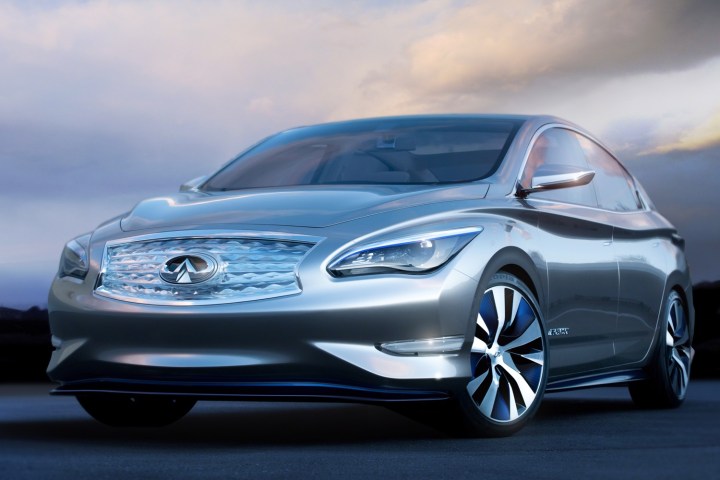
Infiniti expects electrified vehicles to comprise more than half its global sales by 2025. But as with other automaker electrification pronouncements, it’s likely that hybrids will make up the majority of that total. After all, Infiniti only plans to launch its first electric car four years before 2025.
While parent Nissan’s Leaf is the best-selling electric car in history, executives have hesitated to launch a luxury Infiniti model. Infiniti unveiled the LE concept (pictured above), a small luxury sedan with a Leaf powertrain, at the 2012 New York Auto Show. But that car never made it into production.
Infiniti does currently offer hybrid versions of the Q50 and Q70 sedans, and briefly offered a hybrid powertrain in its QX60 crossover. To expand hybridization to the rest of its lineup, Infiniti will borrow on Nissan’s e-Power hybrid system. Unlike the systems used by many automakers, an electric motor handles all propulsion, with the internal-combustion engine acting solely as a generator. The system debuted in 2016 in Japan on the Nissan Note (sold as the Versa Note in the United States) hatchback.
The Infiniti announcement didn’t specifically mention plug-in hybrids, but they may play a part in the automaker’s plans as well. Now that parent Nissan owns Mitsubishi, it is expected to apply the smaller manufacturer’s plug-in hybrid expertise to its own models. That could give Infiniti something to compete against the plug-in hybrids already offered by other luxury brands, including Volvo, BMW, Mercedes-Benz, Porsche, and Land Rover.
Infiniti joins a growing cadre of automakers with ambitious electrification plans. The shift toward electric power is driven primarily by stricter emissions standards. China, the world’s largest new-car market, will institute sales quotas for electric cars and plug-in hybrids in 2019, and some European countries are mulling outright bans on sales of new gasoline and diesel cars. It’s hard to argue with that.


